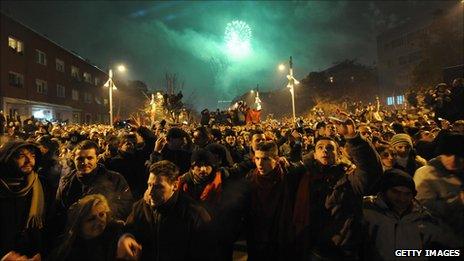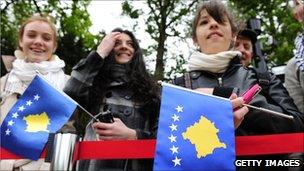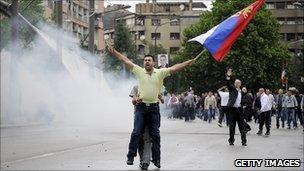Kosovo's cold reality after three years of independence
- Published

Kosovo Albanians celebrate independence on 17 February 2008
As Kosovo marks the third anniversary of its declaration of independence from Serbia, the BBC's Belgrade correspondent, Mark Lowen, assesses the tiny Balkan nation's progress.
The contrast could not have been starker: fireworks roaring into the sky over the Kosovan capital Pristina but mass rioting in Belgrade, in which the US embassy was set ablaze.
The reason: a special parliamentary session in Pristina convened for Sunday 17 February 2008 in which Prime Minister Hashim Thaci addressed the delegates.
"We have waited for this day for a very long time," he said. "From today, Kosovo is proud, independent, sovereign and free."
It was the culmination of years of separatist unrest in what had been Serbia's southern province.

Kosovo has its own national flag and anthem but 117 UN member states have not recognised it
Kosovo's ethnic Albanian majority fought an insurgency against Serb forces in the 1990s, in which more than 10,000 people were killed and hundreds of thousands driven from their homes.
Nato bombed Serb positions to halt the mass ethnic cleansing and in June 1999, Kosovo was placed under UN administration.
But the clamour for independence grew. Serbia refused to countenance the secession of its cherished southern province; the Kosovan Albanians would accept nothing less.
And so Kosovo went ahead and unilaterally declared independence, without UN Security Council backing due to objections from Russia and China. The world's newest country had a protracted and difficult birth.
Turning point
Three years on, what has happened to the most disputed corner of Europe?
It is in the process of state-building, helped by a large international presence. Kosovo has its own government and police force, its own passport, flag and national anthem.
It is a member of the International Monetary Fund and World Bank, but it has only been recognised by 75 countries, including the US and most of the EU.
Many of the other 117 UN member states, such as Spain, Georgia and China, have refused to do so for fear of encouraging secessionist movements in their own backyards. And so Kosovo remains without the majority needed to join the UN.
In July 2010, a turning point. Asked by Serbia to rule on the matter, the International Court of Justice delivered its opinion that Kosovo's declaration of independence had not broken international law.
It was believed that a wave of recognitions would follow. Two months later, Serbia agreed to endorse a UN resolution calling for dialogue between Belgrade and Pristina to resolve outstanding issues, removing an earlier clause that rejected the secession.
It seemed Serbia had softened and that the beginning of the end of the Kosovo issue was in sight.
'Organised crime ring'
But in December last year, everything changed once again.

Ethnic Serbs in northern Kosovo reject statehood
The human rights watchdog, the Council of Europe, published a report alleging that top Kosovan leaders, including the prime minister, had run an organised crime ring in the 1990s involved in assassinations, heroin smuggling and organ trafficking of those captured during the war.
Pristina vehemently rejected the claims but it now seems inevitable that an international investigation will follow. Until then, it is unlikely that still-fragile Kosovo will gain the wider recognition it craves.
And so, in the meantime, this scarred territory limps on, beset by colossal challenges. Unemployment stands at over 40%, almost half the population lives below the poverty line and last December's general election - the first since independence - was marred by serious fraud.
Pristina still fails to control the Serb-dominated north, where residents, backed by Belgrade, reject any trapping of Kosovan statehood. Crime has flourished in the area.
The hope for tiny Kosovo is that fresh momentum can come from the first face-to-face dialogue with Serbia, which should begin soon.
The talks will be sensitive. As Serbia approaches its own election next year, Belgrade will steer clear of issues likely to play into the hands of the nationalists here, who still use Kosovo as a vote-winner.
But topics such as customs and telephones - Serbia has blocked Kosovo from obtaining an international dialling code - will be discussed. Amidst the gloom of the Kosovo dispute, this would be significant progress.
In Kosovo, the fireworks have been replaced by a cold reality.
In Serbia, the flames of rage have begun to simmer, many now believing it is impossible to turn back the clock.
Three years on, Kosovo may have faded from the international headlines but the story has not ended.
- Published8 February 2011
- Published28 January 2011
- Published25 January 2011
- Published13 December 2010